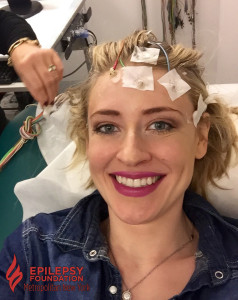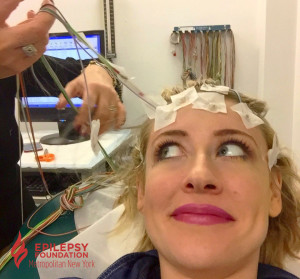I Can Spell Electroencephalogram (EEG)
Recently, my neurologist ordered an EEG test for my epilepsy. EEG stands for electroencephalogram. An EEG records the electrical activity in your brain and it helps doctors detect abnormal electrical activity of the brain. Most types of EEG tests are considered relatively painless. However, like any medical test, from scheduling to prepping for the test, an EEG can always include some inconveniences and annoyances. Anyone who has ever had to remove EEG glue from their hair, understands why I call an EEG “relatively” painless.

I had my first EEG test shortly after I was originally diagnosed with epilepsy when I was six years old. When my parents told me I had to undergo a new test related to my epilepsy, my first question was: “Are there any needles involved?” Luckily, my parents reassured me I would not be receiving a shot, getting an I.V. drip, or giving any blood. Plus, since my doctor prescribed me a sleep deprived EEG, the test prep required me to stay up late, preferably all night. Also, I got to miss a day of school, which was pretty cool! The next morning, my mother took me to my neurologist’s EEG lab. I was placed on a hospital bed and the technician glued electrodes to my head. After an hour of the technician asking me to breathe deeply and blink my eyes, they let me fall asleep. After I woke up, my electrodes were being removed from my head, and I returned home to go to bed. After several sleep deprived EEGs, I realized my mom also had to stay awake all night with me and miss work the next day. While I got to fall asleep for four hours during my EEG, my mom remained awake speaking with the technician or doctor. Now, as an adult, I understand how much an epilepsy diagnosis affects the entire family, from diagnosis to treatment.
In my twenties, I underwent a medication change because I began having a lot of seizures, again. My neurologist prescribed me several 72 hour ambulatory EEGs. For three days, I had a head full of glued-on electrodes. The electrodes were connected to wires, and the wires were connected to a small box recording the results. I could go anywhere, as long as I was still connected to my EEG box and electrodes. At work, I hid my electrode-covered head with a stylish beanie or scarf, allowing me to feel “normal.” Unfortunately, by the end of the first 48 hours, my head was itching like crazy. There was no beanie or scarf to alleviate my itchy head without removing the electrodes; but if these were to fall off, the EEG may have to be repeated! Finally, after the 72 hours, I would return to my neurologist’s office to have the electrodes removed.
After any EEG, the inevitable issue of how to remove EEG glue arises. During this period of my life, I was not connected with the Epilepsy Foundation of Metropolitan New York, so I did not know the Epilepsy Foundation’s magic trick for removing EEG glue:
· Add 5 to 7 crushed aspirin to half a cup of hot water to dissolve. Then, add 2 good size squirts of shampoo, 4 tablespoons witch hazel or seabreeze, and mix well together. Massage the mixture through wet hair and let it sit for about 15 to 20 minutes. Finally, begin to comb through your hair after an allotted time has passed. Rinse and use shampoo and conditioner as usual.
I have never had to undergo a video-telemetry EEG test, which requires a patient to spend days in a hospital wearing an ambulatory EEG box, while being recorded by a video camera. Additionally, during a video-telemetry EEG test, epilepsy medications may be reduced or withdrawn, to increase the chances that you will have a seizure that can be recorded. So, while there are rarely needles involved, I would not dare to categorize all EEGs as “painless.”
 My recent standard EEG lasted for one hour and took place at my doctor’s office. It was the easiest EEG I had ever experienced. But, like epilepsy, even the types of EEG tests can vary. Like any medical procedure, it is important to stay informed and well prepared for an EEG test. The information an EEG test provides is essential for doctors treating epilepsy. Thankfully, this past EEG was totally painless because I finally knew how to remove EEG glue from my hair!
My recent standard EEG lasted for one hour and took place at my doctor’s office. It was the easiest EEG I had ever experienced. But, like epilepsy, even the types of EEG tests can vary. Like any medical procedure, it is important to stay informed and well prepared for an EEG test. The information an EEG test provides is essential for doctors treating epilepsy. Thankfully, this past EEG was totally painless because I finally knew how to remove EEG glue from my hair!
Epilepsy and CARERS Act to Reschedule Cannabis Explained
What is the Compassionate Access and Research Expansion and Respect States (CARERS) Act to reschedule cannabis/ medical marijuana, and how does it relate to epilepsy?
The Compassionate Access and Research Expansion and Respect States (CARERS) Act
Medical Marijuana has been shown to alleviate symptoms of serious medical conditions including rare pediatric epileptic and seizure disorders, cancer, AIDS, and glaucoma.
Twenty-three states and the District of Columbia have passed medical marijuana laws legalizing the use of medical marijuana for qualifying patients under state law. However, the medical use of marijuana remains illegal under federal law. Even in states where medical marijuana laws exist, patients and providers are vulnerable to arrest and interference from federal law enforcement.
The bipartisan Compassionate Access and Research Expansion and Respect States (CARERS) Act would not penalize families from accessing prescribed medicine which ease the symptoms of these life threatening diseases by doing the following:
Ends the federal prohibition of medical marijuana under the federal Controlled Substances Act (CSA)
Marijuana is still illegal under any circumstances according to federal law. Physicians who prescribe marijuana for medical treatment in accordance with state law could still face federal prosecution for prescribing marijuana. The CARERS Act amends the CSA so that states can set their own medical marijuana policies. Individuals in states that take part in medical marijuana programs – patients, providers, businesses – will no longer be in violation of federal law.
Reschedules Marijuana from Schedule I to Schedule II
The Controlled Substances Act currently lists cannabis as a Schedule I drug. Schedule I drugs are those that have a high potential for abuse and has no currently accepted medical use in the United States. Cannabis’s classification as a Schedule I drug adds considerable complexity, expense, and potential access problems for clinical research. The CARERS Act moves marijuana from Schedule I to Schedule II. Under Schedule II the drug has a currently accepted medical use in treatment in the United States and may be prescribed by doctors on a limited basis.
Allow importation of Cannabidiol (CBD)
The CARERS Act would give children and adults with epilepsy and other seizure disorders access to the oil (called CBD) for treatment by removing CBD oil from the federal definition of marijuana in the Controlled Substances Act.
Banks to be allowed to do Business with Marijuana Dispensaries
Many banks do not provide financial services for state-authorized marijuana-related businesses because of fear of criminal penalties. This bill would provide legal immunity from federal criminal prosecution to banks and credit unions, their officers and employees that provide financial services to marijuana-related businesses that engage in activities pursuant to state law.
Research
The federal government retains strict controls over the use of marijuana for research purposes. Research expansion has been hindered by a complicated federal approval process and limited availability of research-grade marijuana. The CARERS Act removes unnecessary bureaucratic hurdles for researchers to gain government approval to carry out research on marijuana.
Access to Medical Marijuana for Veterans
VA doctors are currently prohibited from aiding patients seeking medical use of marijuana.The CARERS Act allows Department of Veterans Affairs doctors to recommend medical marijuana to military veterans suffering from serious injuries or chronic conditions like post-traumatic stress disorder, in states where it is legal.
=========================
For more information on how the Epilepsy Foundation of Metropolitan New York (EFMNY) is getting involved, please visit: http://efmny.org/events/
Take action! Urge your Senators to support the CARERS Act to facilitate research on cannabis and help the epilepsy community gain safe, legal access to this treatment option. For more information on this Epilepsy Foundation ACTION ALERT, and how you can get involved, please visit: http://capwiz.com/efa/issues/alert/?alertid=64207976
